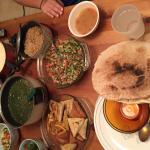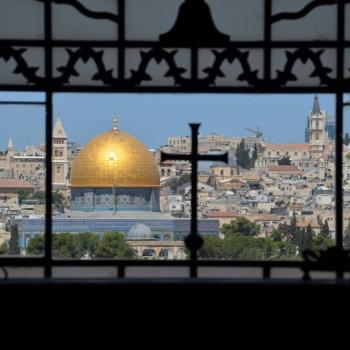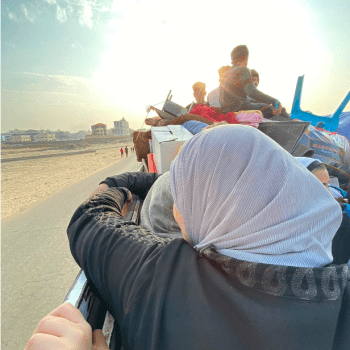Oooooh, the J-word! Talking about jihad, and it’s only the second day of Ramadan! That escalated quickly.
I wanted to talk early on about the five pillars of Islam, to give some foundational info on which to build our understanding. One of those pillars you’ve already read about: the discipline of Ramadan – fasting. Here’s the full list:
- Shahadah, or creed: “There is no god but God, and Mohammed is his prophet”
- Salah, or prayer: dawn, noon, afternoon, evening, and night
- Hajj, or pilgrimage: everyone who is able must visit Mecca once during their lifetime
- Zakat, or charity: everyone must practice charitable giving
- Ramadan: starting at the age of accountability, everyone who is able must participate in the Ramadan fast
Some schools of thought include a sixth pillar: jihad, or struggle – the believer’s internal struggle to live out her/his faith fully; the struggle to defend Islam. Pillar or no pillar, it is a loaded term that has been the source of profound misunderstandings and alienated the East from the West. And it’s an important part of Islam.
And so…let’s talk about jihad.
For many of us in the West, the word “jihad” conjures up pictures of ominous-looking bearded men with swords or machine guns, running around wildly and beheading Christians. Indeed, at the time Islam was born, there were frequent battles between tribes. Today, rogue groups like ISIS perpetuate this stereotype.
But in reality, true jihad in Islam is mostly about the personal struggle to be faithful to God. In that sense, Ramadan may be seen as a form of jihad. If you’ve ever had to fast before a blood test or surgery (usually just a few hours), you can attest – fasting is a struggle!
Our Muslim sisters and brothers living among us contend with their flesh all month – fasting all day from food and drink, from smoking and cursing, and from intimacy. They push themselves to be productive at work in spite of their hunger and tiredness. The cook in each household needs an added layer of discipline, as she (or sometimes he) may spend the whole day in the kitchen!

Ramadan, Saudi-style
Ramadan in Saudi Arabia is nothing like Ramadan in the West. Saudi Arabia is, of course, the birthplace of Islam, and fasting is taken very seriously. No one eats, drinks, smokes, or chews gum in public (non-Muslims must eat and drink in private). In fact, so many accommodations are made for fasting that the entire country turns upside-down for the month.
Work, school, and shopping hours are all truncated during the day – but when bellies are full and bloodstreams are caffeinated, everyone wants to go shopping. So retailers open again after iftar (breaking the fast) and stay open long into the night. Prices are often jacked up to take advantage of everyone’s desire to spend money. Ramadan routines in Saudi Arabia turn night into day and day into night.
When you eat and shop all night, you’re bound to run into trouble when the alarm goes off in the morning – even for a shortened work day. But not to worry. Many businesses excuse workers who don’t feel up to coming in after a particularly gluttonous night. (I’m not suggesting that all Saudis shirk their work responsibilities during Ramadan – but standards and expectations are lowered, enabling many to slack off.)
My husband managed a construction company in Saudi, where six hours was considered a full day in Ramadan (he usually put in ten or more). Some employees actually worked straight through the day – but many did not.
Some came in to the air conditioned office and napped at their desks. The laborers – bricklayers, ironworkers, masons – worked under the Saudi sun until sleep overcame them.
One year, one of hubby’s fairly high-up executives straight up told him that he wouldn’t be working at all during Ramadan. He just couldn’t get up and come to work. There was nothing my husband could do; at the end of the month, the guy collected his paycheck.
That, boys and girls, is not jihad. That is not putting the flesh to the test.
Ramadan at Pizza Hut
I love pizza! Once we decided to go to the local Pizza Hut in Jeddah, Saudi Arabia for iftar. They had a pizza buffet, so….yeah, sign me up! We got there early and grabbed a table. The restaurant was packed with hungry Saudis. When it was almost time to break the fast, waiters started bringing out pizzas of every kind – thin, thick, supreme, Hawaiian, pepperoni, meat-lovers…
We waited patiently. But when it was time to eat, there was no pizza. Everyone else had gone to the buffet ahead of time and piled their plates with slices – I mean, people had the equivalent of an entire pizza pie on their plates, and there was nothing left for those of us who had waited. It was gross.
Eventually more pizzas arrived, and we had our turn. As we left, we looked around at the tables, now deserted, and saw tons of half-eaten slices left behind. It was sad.
That is also not jihad. (I wished Jesus was there to instruct the waiters to pick up twelve baskets of leftovers!)
(I have so many Ramadan stories – and non-Ramadan stories – to tell you. If you haven’t already done so, please subscribe to my newsletter so you won’t miss any!)
Jihad, Christian-style
As Christians, we could stand to learn from our Muslim neighbors – especially those living here in the West, where no accommodations are made during Ramadan. They put in a full day, get by on little sleep, push through caffeine withdrawal. There might be a Muslim in your workplace today who is fasting, and you don’t even know it, because they’re not complaining. One of those people is sitting next to me now – he’s been up since 3 am, fasting since 5:28 am. He put in a nine-hour workday, napped for half an hour, and is working again. That is jihad. (I’m proud of him!)
We Christians could stand to exercise our jihad muscles like that! I know when I see my dear hubby totally crushing it, I’m challenged and inspired.
Colossians 3:5 exhorts us:
Put to death, therefore, whatever belongs to your earthly nature: sexual immorality, impurity, lust, evil desires and greed, which is idolatry (NIV).
Where do you go too easy on yourself? Where do you need to struggle against your flesh a little harder? Suit up – put on the armor of God (Ephesians 6), and get your jihad on!
Appendix:
Just for the record, here’s what the other kind of jihad (“defense of Islam”) is supposed to look like.
Islam sets down clear guidelines as to when war is ethically right, and clear guidelines as to how such a war should be conducted.
In brief, war is permitted:
- in self defense
- when other nations have attacked an Islamic state
- if another state is oppressing its own Muslims
War should be conducted:
- in a disciplined way
- so as to avoid injuring non-combatants
- with the minimum necessary force
- without anger
- with humane treatment towards prisoners of war
(NOTE: this is not what Saudi Arabia’s war with Yemen looks like. And BTW, I have plenty of complaints about Saudi Arabia, but it was my home for ten years, and I have many fond memories of my time there.)
(NOTE: this is a corrected version of this post – in the original, I mistakenly left “salah” off the list of pillars of Islam. My apologies.)
YOU MIGHT WANT TO CHECK OUT THESE PREVIOUS POSTS:
Ramadan for Christians: the basics of Ramadan
Ramadan for Christians – a modest journey into Islam (repeat)
Paradigm shift: the Parable of the Diaper
Interfaith harmony: the kinship of Christians and Muslims
FEATURED IMAGE: “Breakfast Buffet” by mikecogh is licensed under CC BY-SA 2.0













